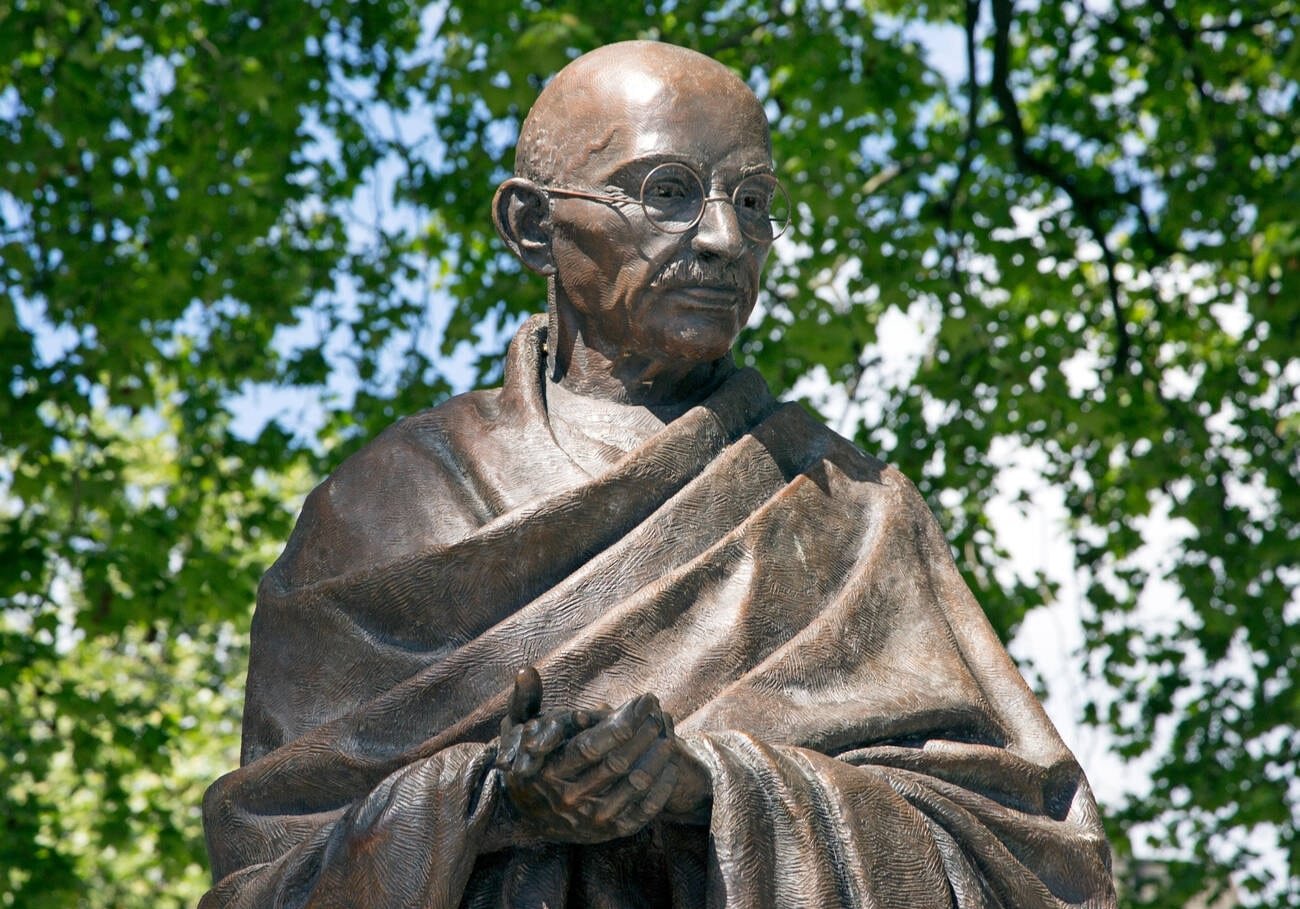
Embracing Sustainability the Gandhi Way: A Path to Harmony and Balance
Anuranjan Jha (Chairman and president), Dhruva Kumar (General Secretary- Gandhian Peace Society)
(Gandhian Peace Society, SC052875 is a registered charity in the United Kingdom. The mission of the Gandhian Peace Society is to promote the idea that non-violence is the most effective means of achieving social change. The organisation accomplishes this mission through various programs and initiatives, including educational programs, community outreach, and advocacy.)
Gandhi’s philosophy of life provides a sustainable development paradigm that is symbiotic with nature and the ecosystem. In the Gandhian frame of reference, economy, ecology and spirituality are interrelated. That is why the Gandhian economy is often referred to as the ‘economy of the environment’.
The Gandhian way stands as a shining beacon of hope in a world marked by conflicts, disputes, and struggles for power. Mahatma Gandhi’s principles of non-violence, truth, and peace have guided individuals and proven sustainable for the peacekeeping efforts of governments, the public, and policymakers. This article post will explore why the Gandhian way is the only sustainable approach for achieving lasting peace and how it can be implemented in various world domains.
Gandhi wanted a “harmonious, poverty-free, nonviolent development process that contributes to a self-reliant society.” He envisaged the co-existence of steel mills, machine-making in cities with handicrafts, cottage industries, animal husbandry, forestry and biomass processing in villages. He believed the development process should be “harmonious, poverty-free, nonviolent and contributes to a self-reliant society” 2. Gandhi’s ideas are also reflected in the total value shift in production, consumption, habits and political systems 1. In Mahatma Gandhi’s opinion, man should be at the centre of any development scheme.
1. The Power of Non-violence: A Pathway to Sustainable Peace
Non-violence lies at the core of the Gandhian philosophy, advocating for peaceful means of resolving conflicts. It emphasises dialogue, understanding, and mutual respect rather than resorting to violence or forceful measures. This approach has proved to be effective in maintaining peace within societies, preventing escalation of conflicts, and fostering long-term stability.
By embracing non-violence, governments can create an atmosphere of trust and harmony among their citizens. Public protests, when approached with non-violence, can exert pressure on authorities without turning into chaos. Policymakers can use nonviolent strategies to bring about social reforms and address grievances, enhancing society’s overall well-being.
Gandhi’s development vision aims at peace and harmony with self, others, and nature. He believed that development should be for the purpose of achieving these goals, rather than solely for economic prosperity.
2. Truth as the Foundation of Sustainable Peace
Gandhi believed that truth is the ultimate weapon against injustice and conflict. By embracing truthfulness, governments, the public, and policymakers can establish a solid foundation for sustainable peacekeeping. Transparent and accountable governance based on truth prevents corruption, manipulation, and the erosion of trust.
Public institutions must function with integrity and honesty, ensuring that decisions are made in the people’s best interest. Policymakers should prioritise transparency in their actions and policies, actively seeking feedback from the public to foster a sense of ownership and inclusiveness. By embracing truthfulness as a guiding principle, governments can build strong relationships with their citizens, resulting in a more peaceful and stable society.
Gandhi’s idea of development was centered around the principle of the Love Force or Soul Force, which has not been duly acknowledged by the forces promoting material development driven by the rapidly expanding scope of science and technology in economic and social affairs.
3. Embracing Peace: A Sustainable Approach to Conflict Resolution
Conflicts are an inevitable part of human existence, but how we approach and resolve them determines the sustainability of peace. The Gandhian way encourages individuals, governments, public, and policymakers to embrace peace as the ultimate goal and to find solutions through dialogue, negotiation, and compromise.
Instead of resorting to military interventions or imposing solutions, governments can invest in diplomacy, mediation, and reconciliation efforts. Public participation should be encouraged, allowing different perspectives to be heard and considered. Policymakers must prioritise inclusive decision-making processes that address the underlying causes of conflicts, promoting sustainable peace rather than short-term resolutions.
4. Environmental Sustainability
Gandhi’s philosophy of environmental sustainability is based on the co-existence of steel mills, machine making in cities with handicrafts, cottage industries, animal husbandry, forestry, and biomass processing in villages. Gandhi’s emphasis on localised economies and social development could be a critical guiding force towards sustainable development.
Gandhi’s minimalist lifestyle has inspired millions of people around the world to walk on the path of sustainable development.
5. Sustainable Agriculture
Gandhi emphasised the importance of sustainable agriculture practices. Today, sustainable farming methods aligned with organic and regenerative agriculture principles resonate with Gandhian ideals, promoting ecological balance and reducing reliance on harmful chemicals.
Gandhian principles advocate for social and economic justice. Modern sustainability goals often incorporate social equity considerations, recognising that environmental issues are interconnected with issues of poverty and inequality globally.
Conclusion
The Gandhian way, rooted in non-violence, truth, and peace, provides a sustainable framework for governments, the public, and policymakers to achieve lasting peacekeeping. By embracing nonviolent means, governments can create an atmosphere of trust and harmony within societies. Truthfulness serves as the foundation for transparent governance, preventing corruption and fostering accountability. Embracing peace as the ultimate goal enables conflict resolution through dialogue and compromise, leading to long-term stability.
In a world yearning for peace, let us all reflect on the Gandhian way and strive to adopt its principles in our personal lives, communities, and global interactions. By embracing this sustainable approach, we can only truly pave the path towards a more peaceful and harmonious future.
We would love to hear your views on the following questions.
Q/A Section
- How can non-violence contribute to sustainable peacekeeping efforts?
- What role does truthfulness play in establishing a foundation for peace?
- Why is embracing peace as a goal essential for long-term stability in societies?
Please write to us at info@gandhi.foundation
If you are interested in learning more about the Gandhian Peace Society or want to get involved in its work, you can visit its website Gandhi.Foundation
Follow our:
Facebook page: https://www.facebook.com/GandhianPeaceSociety/
Twitter Page: https://twitter.com/GandhianPeaceUK
LinkedIn: https://www.linkedin.com/in/gandhianpeacesociety/
Or contact its email address at Info@Gandhi.Foundation
You can also subscribe to its newsletter to receive updates and invitations for upcoming events and activities.
The Gandhian Peace Society is a charity for non-violence and harmony that strives to help establish a world founded on truth, ahimsa, peaceful co-existence, and love for labour. Join us today and be part of this noble and inspiring cause.
Join us today and be part of this noble and inspiring cause.
All Categories
Recent Posts
Scottish Parliament Group Endorses Groundbreaking Hinduphobia
Revitalising Global Governance: The Gandhian Paradigm
Tags
Sign up for news updates
+44 7404 405230
info@gandhi.foundation




